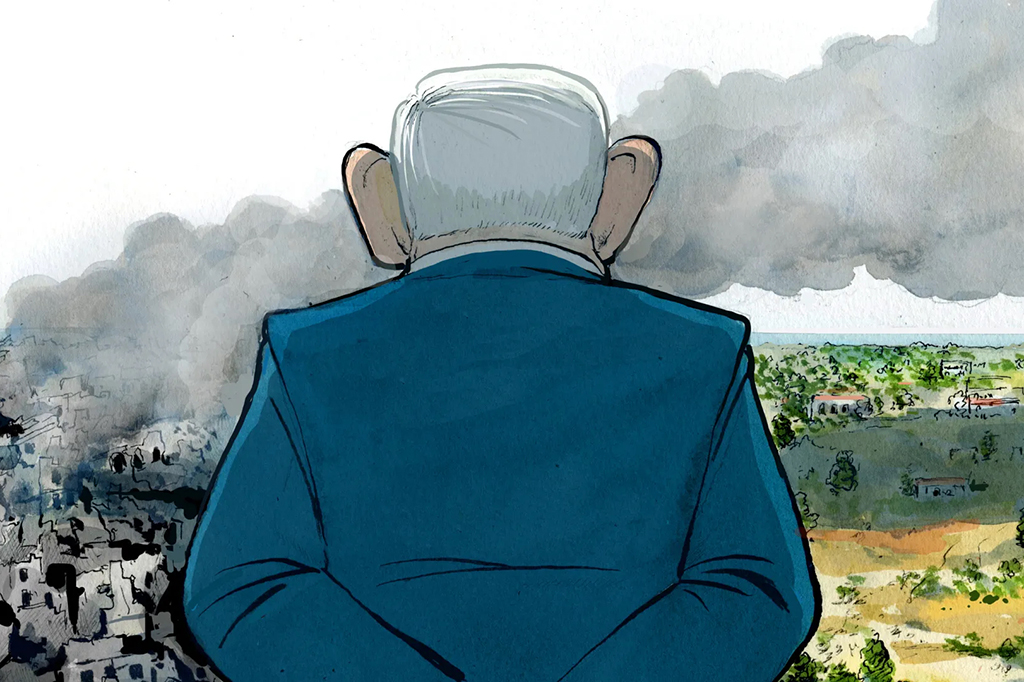A leading member of Israel’s wartime cabinet threatened to resign should Benjamin Netanyahu fail to present a strategy for ending the war in Gaza. The liberal politician Benny Gantz, who would win an election were one held now, gave a public ultimatum. He would collapse Netanyahu’s fragile coalition if no peace plan is delivered by Saturday. Gantz resigned on Sunday.
Netanyahu might believe he’s a Churchill; most Israelis consider him a Chamberlain
Meanwhile, the largest protest since October 7 took place last weekend when 120,000 Israelis marched in Tel Aviv. Families of the 120 hostages held in Gaza (at least a third of whom are presumed dead) have joined the growing demonstrations against the government. Relatives, who have been at the center of the protests, have found themselves physically attacked by the police, as well as by a small band of Netanyahu loyalists. One of Gantz’s aides tells me: “The only thing preventing a massive outbreak of protests — protests that the reservists back from Gaza will join too — is Gantz still in the war cabinet. The moment he leaves, Israelis will feel they have no one looking out for the national interest in government and rise up.”
Joe Biden put more pressure on Netanyahu last week by revealing an Israeli proposal for a ceasefire. But should an agreement be reached with Hamas, Netanyahu would have to bring the deal to his cabinet. Many of his ministers are opposed to the war ending. Pushing the agreement through might well cost Netanyahu his parliamentary majority. Two far-right ministers, Itamar Ben-Gvir and Bezalel Smotrich, have said they’ll leave the government if Netanyahu accepts.
The prime minister is between a rock and a hard place. Fold to the hardliners and Gantz leaves the coalition. If Netanyahu does what Gantz wants, the hardliners will collapse the coalition.
Netanyahu knows he’s become increasingly isolated, at home and abroad. So, in an act of supreme narcissism, he’s had his right-hand man, strategic affairs minister Ron Dermer, lobby Republican leaders in the US for an invitation to address Congress.
Netanyahu will be the only world leader to have addressed Congress four times, surpassing Winston Churchill. He spies a chance to galvanize support for Israel and restore his tarnished image as its savior and protector. Netanyahu is convinced Israelis will watch the speech and see him once again for the master statesman he truly is. Perhaps. He might believe he’s a Churchill; most Israelis consider him a Chamberlain.
This is increasingly how his cabinet perceives him, too. Leaked messages between transport minister Miri Regev and one of her aides saw the aide advising the minister that: “The cards have been redealt. Netanyahu is over after the war. The nation won’t allow him to continue.” To which Regev responded: “That’s right. We will talk about it.” Defense minister Yoav Gallant recently lambasted Netanyahu at a press conference for failing to decide who should control civilian affairs in Gaza. Business minister Nir Barkat accused him of “cowardice.” Netanyahu hit back in a cabinet meeting: he spoke of those “who know nothing and are encouraging our enemies just to get headlines.” Yet he’s done nothing to discipline wayward ministers.
The war is the only thing keeping Netanyahu in power. Polls show just a quarter of Israelis support him continuing once the conflict ends. Around a third want elections held immediately. A slightly larger proportion want them held afterwards. In other words, the vast majority of Israelis want Netanyahu to leave.
Netanyahu hasn’t only lost control of his ministers, but of the security establishment. Anonymous officers have been briefing journalists that the lack of a coherent strategy for ending the war risks “squandering” the battlefield gains. Netanyahu and his generals have argued since the start of the war over who bears most responsibility for October 7. The commander of military intelligence recently announced his resignation. Netanyahu, however, has stuck to a vague formula, claiming “everyone bears responsibility.” His supportive media proxies, meanwhile, have waged an online war to smear the generals.
The public divisions between Netanyahu and the security establishment aren’t only hampering the war effort and eroding public trust; they’re also hindering negotiations with Hamas. Israel’s negotiating team is made up of members of the intelligence services — which Netanyahu has been trying to limit — but its mandate comes from the cabinet.
Netanyahu’s media proxies have also been producing online statements and videos of masked soldiers who insist they will disobey orders to withdraw from Gaza, casting the generals and the defense minister as traitorous defeatists. It’s hard to say whether these indicate any real motivation among the troops towards mutiny. Outwardly, at least, it has the hallmarks of a civil war brewing.
All the while, Israel is losing allies. Immediately after October 7, the country had broad international support. That’s now wavering. The US continues to supply weapons, but has expressed its irritation by delaying a shipment of bombs. The administration is urging Israel to restrain its Rafah offensive and accept a ceasefire. As the US focuses inwards on its presidential election, the administration’s inclination to act as Israel’s international protector is weakening.
Nearly eight months into what is looking like an intractable war, and with another conflict worsening on Israel’s northern border with Hezbollah (huge fires broke out on Monday in the Galilee after a barrage of rockets), Israelis haven’t heard from their prime minister about how he intends to fix it. Netanyahu hasn’t given a single interview to Israeli media since the war began, though he’s found time for American interviewers, including, absurdly, one with TV personality Dr. Phil. Little attention, moreover, has been given to the 100,000 Israelis who were evacuated from their homes near the Lebanon border after October 7 and haven’t returned.
Netanyahu will take off for Washington on his brand new Boeing jet, a vanity project that’s ended up being hundreds of millions of shekels over budget. He’ll likely be met with Republican adulation in Congress. Afterwards, however, he’ll arrive home to a potentially collapsed government, and to what’s become, under his rule, a divided country.
This article was originally published in The Spectator’s UK magazine. Subscribe to the World edition here.


























Leave a Reply